Brian Magi
 I earned my PhD in Atmospheric Sciences in 2006 from the University of Washington, and my BSc in Physics/Applied Math in 1998 from the University of Arizona. I worked as a postdoc at NOAA GFDL from 2007-2011, started at UNC Charlotte in 2011, and earned tenure in 2017. In January 2021, I started as our department’s Graduate Program Director (GPD) for the MS Earth Sciences program. My research explores air quality using low-cost air monitors, and data-oriented questions about climate. I work with students, academic and government researchers, regulators, non-profits, and communities on these questions.on these questions, but I also simply enjoy spending time tackling enormous datasets related to air quality and climate to better understand the Earth system. I teach courses at UNC Charlotte on topics related to air quality, cloud physics, atmospheric electricity, data analysis methods, programming for Earth Sciences, and global environmental change, all of which are original courses that I have created since 2011. Contact me anytime at brian dot magi at charlotte dot edu. I am always looking to recruit students with programming and data analysis experience, keeping in mind that my expertise is air quality and climate.
I earned my PhD in Atmospheric Sciences in 2006 from the University of Washington, and my BSc in Physics/Applied Math in 1998 from the University of Arizona. I worked as a postdoc at NOAA GFDL from 2007-2011, started at UNC Charlotte in 2011, and earned tenure in 2017. In January 2021, I started as our department’s Graduate Program Director (GPD) for the MS Earth Sciences program. My research explores air quality using low-cost air monitors, and data-oriented questions about climate. I work with students, academic and government researchers, regulators, non-profits, and communities on these questions.on these questions, but I also simply enjoy spending time tackling enormous datasets related to air quality and climate to better understand the Earth system. I teach courses at UNC Charlotte on topics related to air quality, cloud physics, atmospheric electricity, data analysis methods, programming for Earth Sciences, and global environmental change, all of which are original courses that I have created since 2011. Contact me anytime at brian dot magi at charlotte dot edu. I am always looking to recruit students with programming and data analysis experience, keeping in mind that my expertise is air quality and climate.
Graduate Students
Wes Taylor
 Wes Taylor joined the EEGS community from Millersville University in Pennsylvania. He is an MS Earth Sciences student here at UNC Charlotte now and, as of Fall 2025, is working to finish some of his undergraduate research and design new research as a graduate student. Wes is interested in space weather and how regional weather and climate variability is and is not connected with natural and forced climate variations ranging from short and long term variations in solar flux to the Madden-Julian Oscillation to Atmospheric Angular Momentum to the Global Wind Oscillation and more. Wes will be at the AMS meeting in January 2026 (in Houston) to present research he did while he was an undergraduate at Millersville. In the meantime, you can find him roaming the halls and TA’ing for METR 1102 lab sections.
Wes Taylor joined the EEGS community from Millersville University in Pennsylvania. He is an MS Earth Sciences student here at UNC Charlotte now and, as of Fall 2025, is working to finish some of his undergraduate research and design new research as a graduate student. Wes is interested in space weather and how regional weather and climate variability is and is not connected with natural and forced climate variations ranging from short and long term variations in solar flux to the Madden-Julian Oscillation to Atmospheric Angular Momentum to the Global Wind Oscillation and more. Wes will be at the AMS meeting in January 2026 (in Houston) to present research he did while he was an undergraduate at Millersville. In the meantime, you can find him roaming the halls and TA’ing for METR 1102 lab sections.
Undergraduate Students
None currently – talk with me if you are interested in air quality and/or climate data analysis projects that you think might be scaled for a semester or for part of the summer.
Future Graduate Students and Undergraduate Students
If you are interested in working on a graduate or undergraduate research project that you think I might have the expertise to advise, then please visit my Prospective Students to do some reading. Then reach out to me via email!
Alumni
Informal archive of undergraduate and graduate students I have worked with. The goal for every student is to graduate and go do great things for our amazing planet!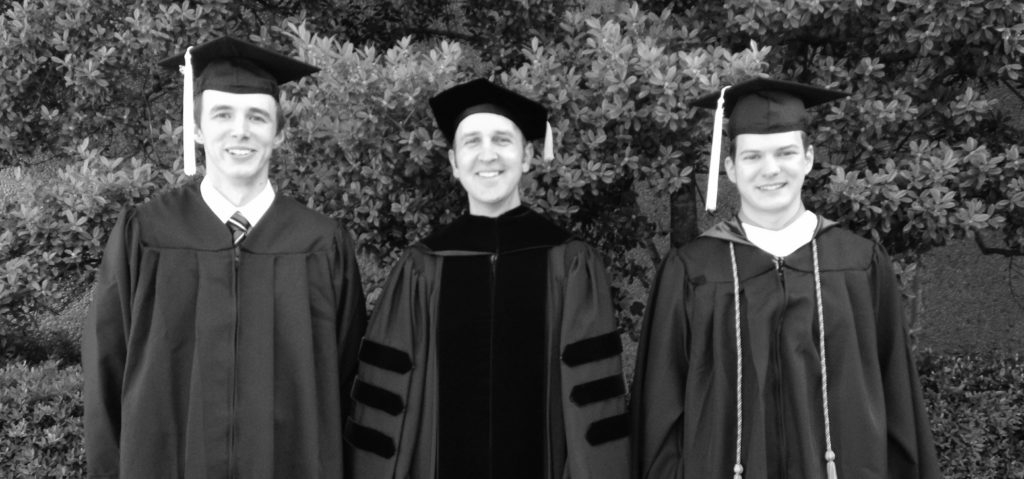
Carolina Cardona
 Carolina Cardona graduated from UNC Charlotte with her BS Meteorology in Spring 2021, and worked in industry as a forecaster. She then applied to and was accepted into our MS Earth Sciences program and started in Spring 2023, graduating with her MS in Spring 2024. In her MS research, she explored global patterns of weather variability and the relationship of those patterns to the Ensemble Oceanic Nino Index. Carolina’s research helped re-examine the statistical strength and stability of ENSO-weather relationships around the world, specifically looking at how those teleconnnections have changed from 1850 to present. One way to frame her research is to ask whether global warming is changing ENSO teleconnections. Finally, Carolina also made important contributions to our department as a Teaching Assistant for ESCI 1101 Labs. Right after Carolina graduated with her MS, she got a job as a Climate Engagement Specialist at NCICS in Asheville!
Carolina Cardona graduated from UNC Charlotte with her BS Meteorology in Spring 2021, and worked in industry as a forecaster. She then applied to and was accepted into our MS Earth Sciences program and started in Spring 2023, graduating with her MS in Spring 2024. In her MS research, she explored global patterns of weather variability and the relationship of those patterns to the Ensemble Oceanic Nino Index. Carolina’s research helped re-examine the statistical strength and stability of ENSO-weather relationships around the world, specifically looking at how those teleconnnections have changed from 1850 to present. One way to frame her research is to ask whether global warming is changing ENSO teleconnections. Finally, Carolina also made important contributions to our department as a Teaching Assistant for ESCI 1101 Labs. Right after Carolina graduated with her MS, she got a job as a Climate Engagement Specialist at NCICS in Asheville!
Allison Van Ormer
 Allison (“Ali”) graduated from UNC Charlotte’s undergraduate program in the Fall of 2020 after earning a BS in Meteorology and a BS in Geography. She was admitted to the MS Earth Sciences program in Fall 2021 and we worked on a research project related to data-based changes in seasons around the world. Allison really dug in with the Matlab coding needed to study the research questions she posed for her MS Thesis. She even found time in her first summer to collaborate with wind research scientists as a part of a paid NCAR internship, doing that large dataset analysis in Python. Finally, Ali was a Teaching Assistant in all of her four semesters as an MS student contributing to the fundamental mission of our university. She successfully defended her MS Thesis titled “Long-term Changes In Seasonal Temperature Extremes Worldwide” in April 2023, and I hope to work with her to try and publish the findings. If you’re wondering, her results were simple and still shocking: Seasons are much much warmer than were in the past. What Ali did was quantify how far outside the “envelope” seasonal warmth is relative to the climatological average.
Allison (“Ali”) graduated from UNC Charlotte’s undergraduate program in the Fall of 2020 after earning a BS in Meteorology and a BS in Geography. She was admitted to the MS Earth Sciences program in Fall 2021 and we worked on a research project related to data-based changes in seasons around the world. Allison really dug in with the Matlab coding needed to study the research questions she posed for her MS Thesis. She even found time in her first summer to collaborate with wind research scientists as a part of a paid NCAR internship, doing that large dataset analysis in Python. Finally, Ali was a Teaching Assistant in all of her four semesters as an MS student contributing to the fundamental mission of our university. She successfully defended her MS Thesis titled “Long-term Changes In Seasonal Temperature Extremes Worldwide” in April 2023, and I hope to work with her to try and publish the findings. If you’re wondering, her results were simple and still shocking: Seasons are much much warmer than were in the past. What Ali did was quantify how far outside the “envelope” seasonal warmth is relative to the climatological average.
Andrew Robinson
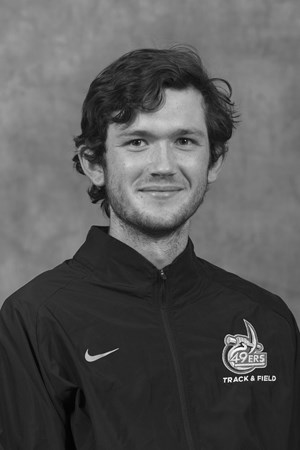 Andrew Robinson graduated from UNC Charlotte in May 2020 with a BS in Earth and Environmental Sciences, and then earned his MS in Earth Sciences in Spring 2022 after starting in Fall 2020, during the heart of COVID-19 shutdowns. His Masters research project focused on downscaled climate model output for North Carolina and the variations in the future warming and moisture regimes across our very geographically diverse state of North Carolina (mountains, piedmont, coastal plains). He presented preliminary findings at regional conferences and successfully defended his MS Thesis titled “Using Downscaled Climate Model Output to Examine Climate Change in North Carolina” in April 2022. After graduating with his MS, he was accepted to the Geography PhD program at UNC Charlotte and attended through Spring 2023, working under the supervision of Dr Katherine Idzoriak. He is now pursuing a Geography PhD at UNC Chapel Hill, having started in Fall 2023. At UNC Chapel Hill and the Southeast Regional Climate Center, Andrew is building up skillsets to tackle questions about documenting impacts of global warming on North Carolina. From the SERCC webpage, Andrew is “currently working on a project which examines impacts of various synoptic weather patterns and land use/land cover on the spatial distribution and intensity of intra-urban UHIs.”
Andrew Robinson graduated from UNC Charlotte in May 2020 with a BS in Earth and Environmental Sciences, and then earned his MS in Earth Sciences in Spring 2022 after starting in Fall 2020, during the heart of COVID-19 shutdowns. His Masters research project focused on downscaled climate model output for North Carolina and the variations in the future warming and moisture regimes across our very geographically diverse state of North Carolina (mountains, piedmont, coastal plains). He presented preliminary findings at regional conferences and successfully defended his MS Thesis titled “Using Downscaled Climate Model Output to Examine Climate Change in North Carolina” in April 2022. After graduating with his MS, he was accepted to the Geography PhD program at UNC Charlotte and attended through Spring 2023, working under the supervision of Dr Katherine Idzoriak. He is now pursuing a Geography PhD at UNC Chapel Hill, having started in Fall 2023. At UNC Chapel Hill and the Southeast Regional Climate Center, Andrew is building up skillsets to tackle questions about documenting impacts of global warming on North Carolina. From the SERCC webpage, Andrew is “currently working on a project which examines impacts of various synoptic weather patterns and land use/land cover on the spatial distribution and intensity of intra-urban UHIs.”
Eric Webb
 Eric was an MS Earth Sciences student who started in Fall 2018 after graduating from the NC State with a Meteorology major and Oceanography minor. For his MS research project, he focused on ENSO indices and worked on a way to rigorously update the Multivariate ENSI Index or “MEI”, which is work that he started more or less on his own before joining us at UNC Charlotte. Eric is a student of weather and climate, and has contributed to on-going discussions about tropical meteorology on social media. He also maintains a really nice webpage of NC snow climatologies. He presented ENSO MEI research at AMS 2020 in Boston – you can see his poster description here. He completed his Masters in Earth Sciences in Fall 2020 during the heart of COVID-19 shutdowns at an in-person (!) defense. After Eric finished his MS, we worked hard to fine tune the work from his Masters Thesis and got a part of it published in an open-access peer-reviewed journal. In that published paper, we focused on studying SST anomalies in the Nino3.4 region and created what Eric dubbed the Ensemble Oceanic Nino Index, or Ensemble ONI for short. Both Eric’s Masters research and the work we did to move part of his Masters work into publication involved wrangling a huge number of observational, reanalysis, and model datasets. After he graduated and even after we published his work, I nominated Eric for the UNC Charlotte Outstanding Masters Thesis award, which he won in the category of “Math, Physical Sciences, and Engineering” category! His Thesis beat out the work from all other Masters students in that category (eg. Physics, Chemistry, Engineering) at UNC Charlotte (graduate student population of about 5000) so it was tough competition. Eric received a small monetary award and a plaque from UNC Charlotte, but then we received more news about his Outstanding Thesis: His Thesis won the Conference of Southern Graduate Schools (CSGS) top honors, beating out Masters theses from Math, Physical Sciences, and Engineering students attending graduate schools in 15 states in the southern region of the United States, ranging from Texas to Maryland. Wow. Eric’s Masters thesis was evaluated against another very deep pool of competition and it again rose to the top! He received a small monetary award from CSGS, and was awarded travel funding to give a speech at the Spring 2023 CSGS meeting in Tampa, Florida. Oh, and Eric was 1st MS student in UNC Charlotte history to win the CSGS award. Well, no wonder we got his Ensemble ONI work published – it was really good!! Eric is now a forecaster with an Army Forecast Office in beautiful southern New Mexico, but you can find him on his twitter feed. He and I are still tossing ideas back and forth on how to publish a more complex ENSO index that is much closer to what he did for his highly-recognized MS Thesis.
Eric was an MS Earth Sciences student who started in Fall 2018 after graduating from the NC State with a Meteorology major and Oceanography minor. For his MS research project, he focused on ENSO indices and worked on a way to rigorously update the Multivariate ENSI Index or “MEI”, which is work that he started more or less on his own before joining us at UNC Charlotte. Eric is a student of weather and climate, and has contributed to on-going discussions about tropical meteorology on social media. He also maintains a really nice webpage of NC snow climatologies. He presented ENSO MEI research at AMS 2020 in Boston – you can see his poster description here. He completed his Masters in Earth Sciences in Fall 2020 during the heart of COVID-19 shutdowns at an in-person (!) defense. After Eric finished his MS, we worked hard to fine tune the work from his Masters Thesis and got a part of it published in an open-access peer-reviewed journal. In that published paper, we focused on studying SST anomalies in the Nino3.4 region and created what Eric dubbed the Ensemble Oceanic Nino Index, or Ensemble ONI for short. Both Eric’s Masters research and the work we did to move part of his Masters work into publication involved wrangling a huge number of observational, reanalysis, and model datasets. After he graduated and even after we published his work, I nominated Eric for the UNC Charlotte Outstanding Masters Thesis award, which he won in the category of “Math, Physical Sciences, and Engineering” category! His Thesis beat out the work from all other Masters students in that category (eg. Physics, Chemistry, Engineering) at UNC Charlotte (graduate student population of about 5000) so it was tough competition. Eric received a small monetary award and a plaque from UNC Charlotte, but then we received more news about his Outstanding Thesis: His Thesis won the Conference of Southern Graduate Schools (CSGS) top honors, beating out Masters theses from Math, Physical Sciences, and Engineering students attending graduate schools in 15 states in the southern region of the United States, ranging from Texas to Maryland. Wow. Eric’s Masters thesis was evaluated against another very deep pool of competition and it again rose to the top! He received a small monetary award from CSGS, and was awarded travel funding to give a speech at the Spring 2023 CSGS meeting in Tampa, Florida. Oh, and Eric was 1st MS student in UNC Charlotte history to win the CSGS award. Well, no wonder we got his Ensemble ONI work published – it was really good!! Eric is now a forecaster with an Army Forecast Office in beautiful southern New Mexico, but you can find him on his twitter feed. He and I are still tossing ideas back and forth on how to publish a more complex ENSO index that is much closer to what he did for his highly-recognized MS Thesis.
Alex Schaeffer
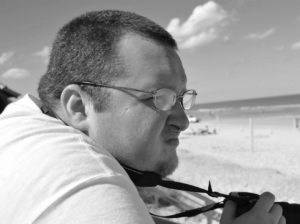 Alex started in the INES PhD program here at UNC Charlotte in Fall 2015 after earning a Masters degree in Atmospheric Sciences from South Dakota School of Mines and Technology. He worked as a Graduate Research Assistant in INES as a part of an NSF-funded project titled “Collaborative Research: Testing Hypotheses About Fire Using Data Syntheses and Fire Modeling” which I was co-PI on with Dr. Jenn Marlon (Yale U) and Dr. Patrick Bartlein (U of Oregon). Alex built up his PhD background using the NCAR Last Millennium Ensemble, and population and vegetation/land-use patterns from the last millennium. Initially, we thought we could leverage LME and all those data, as well as paleoproxy records of past fire to pose and address hypotheses about interconnections among fire, climate, lightning, and humans at paleoclimate timescales, but the research path is rarely straight. Soooooo, Alex shifted his focus into specific fire-climate interactions that leverage some very interesting satellite based data. He studied how soil moisture and fire are related at sub-seasonal timescales, and across a number of different spatial scales, and published a peer-reviewed paper in the journal Fire that not only leverages soil moisture and fire data, but throws in a dimension of human land-use as a filter. Read it here: Land-Cover Dependent Relationships between Fire and Soil Moisture (Open Access). Alex travelled a non-linear path that included participating in an NSF and PAGES funded workshop that I co-organized with a couple of colleagues in September 2015 at Harvard Forest, video meetings (back before COVID-19), presented at AGU in New Orleans here and here, and at AAG as well. He offset some of his grad school costs as a Teaching Assistant, and with summer funding from our Graduate School (here). But in the end, he left UNC Charlotte as a PhD Candidate.
Alex started in the INES PhD program here at UNC Charlotte in Fall 2015 after earning a Masters degree in Atmospheric Sciences from South Dakota School of Mines and Technology. He worked as a Graduate Research Assistant in INES as a part of an NSF-funded project titled “Collaborative Research: Testing Hypotheses About Fire Using Data Syntheses and Fire Modeling” which I was co-PI on with Dr. Jenn Marlon (Yale U) and Dr. Patrick Bartlein (U of Oregon). Alex built up his PhD background using the NCAR Last Millennium Ensemble, and population and vegetation/land-use patterns from the last millennium. Initially, we thought we could leverage LME and all those data, as well as paleoproxy records of past fire to pose and address hypotheses about interconnections among fire, climate, lightning, and humans at paleoclimate timescales, but the research path is rarely straight. Soooooo, Alex shifted his focus into specific fire-climate interactions that leverage some very interesting satellite based data. He studied how soil moisture and fire are related at sub-seasonal timescales, and across a number of different spatial scales, and published a peer-reviewed paper in the journal Fire that not only leverages soil moisture and fire data, but throws in a dimension of human land-use as a filter. Read it here: Land-Cover Dependent Relationships between Fire and Soil Moisture (Open Access). Alex travelled a non-linear path that included participating in an NSF and PAGES funded workshop that I co-organized with a couple of colleagues in September 2015 at Harvard Forest, video meetings (back before COVID-19), presented at AGU in New Orleans here and here, and at AAG as well. He offset some of his grad school costs as a Teaching Assistant, and with summer funding from our Graduate School (here). But in the end, he left UNC Charlotte as a PhD Candidate.
Calvin Cupini
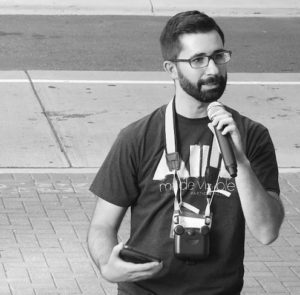 Calvin Cupini, Earth and Environmental Sciences major from our department, worked on Independent Study related to air quality data and visualization in Fall 2016 and Spring 2017. Calvin actually helped collect data near Lake Lure when western Carolina had horrible fire smoke pouring into Charlotte, and he even saturated my ground-based instrument with smoky air. He got the data though! While an undergraduate at UNC Charlotte, Calvin created and got a job as the first “Citizen Science Program Manager” at the Charlotte-based non-profit CleanAIRE NC. In 2016-2017, Calvin and I spearheaded hyperlocal air quality data collection in Mecklenburg County (see our publication in Aerosol Science and Technology, and he continued that work at CleanAIRE NC (which was then “Clean Air Carolina”) for several years by extending that data collection statewide. I continue the work Calvin started at CleanAIRE NC by bringing my own expertise to bear on air quality measurement and monitoring projects. Calvin was instrumental (pun intended) in designing a way to monitor particulate matter pollution in and around North Carolina. He and I started this effort in Mecklenburg County, and the idea has snowballed into a statewide effort. The amount of work required to move this forward was pretty amazing. In the meantime, keep watch on your air and let us know if you want to participate or help us out. We also have a ton of data to analyze, so stay tuned.
Calvin Cupini, Earth and Environmental Sciences major from our department, worked on Independent Study related to air quality data and visualization in Fall 2016 and Spring 2017. Calvin actually helped collect data near Lake Lure when western Carolina had horrible fire smoke pouring into Charlotte, and he even saturated my ground-based instrument with smoky air. He got the data though! While an undergraduate at UNC Charlotte, Calvin created and got a job as the first “Citizen Science Program Manager” at the Charlotte-based non-profit CleanAIRE NC. In 2016-2017, Calvin and I spearheaded hyperlocal air quality data collection in Mecklenburg County (see our publication in Aerosol Science and Technology, and he continued that work at CleanAIRE NC (which was then “Clean Air Carolina”) for several years by extending that data collection statewide. I continue the work Calvin started at CleanAIRE NC by bringing my own expertise to bear on air quality measurement and monitoring projects. Calvin was instrumental (pun intended) in designing a way to monitor particulate matter pollution in and around North Carolina. He and I started this effort in Mecklenburg County, and the idea has snowballed into a statewide effort. The amount of work required to move this forward was pretty amazing. In the meantime, keep watch on your air and let us know if you want to participate or help us out. We also have a ton of data to analyze, so stay tuned.
Stephanie Edwards
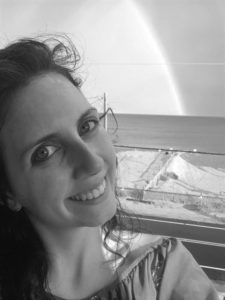 Stephanie started in Spring 2016 as a Masters in Earth Sciences student after her work at NC State in their Meteorology program. She graduated from UNC Charlotte in Spring 2018 after finishing an excellent Masters project focused on digging out lightning-microwave relationships in the Southeastern USA. Specifically, she worked on empirically modeling the statistical relationship between lightning detected using the National Lightning Detection Network dataset and satellite microwave remote sensing data from SSM/I. She was storm-chasing in the world of data and found some pretty interesting results about the Southeast USA! We have a manuscript lingering in preparation related to her Masters work, if I ever carve out time.
Stephanie started in Spring 2016 as a Masters in Earth Sciences student after her work at NC State in their Meteorology program. She graduated from UNC Charlotte in Spring 2018 after finishing an excellent Masters project focused on digging out lightning-microwave relationships in the Southeastern USA. Specifically, she worked on empirically modeling the statistical relationship between lightning detected using the National Lightning Detection Network dataset and satellite microwave remote sensing data from SSM/I. She was storm-chasing in the world of data and found some pretty interesting results about the Southeast USA! We have a manuscript lingering in preparation related to her Masters work, if I ever carve out time.
–
–
Gabrielle Keaton
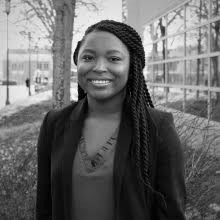 Gabrielle Keaton finished her Meteorology BSc in Spring 2020 (yes, the COVID19 semester), and worked with me in that same semester. She studied how ENSO variability is related to USA weather patterns using Eric Webb’s preliminary Extended MEI Version 2.
Gabrielle Keaton finished her Meteorology BSc in Spring 2020 (yes, the COVID19 semester), and worked with me in that same semester. She studied how ENSO variability is related to USA weather patterns using Eric Webb’s preliminary Extended MEI Version 2.
–
–
–
–
Evan Blomquist
 Evan Blomquist finished his Earth and Environmental Sciences BSc, and I worked with him on undergraduate research in Spring 2019. He studied low-cost air monitor data collected on UNC Charlotte campus. He went on to finish an MS Earth Sciences degree in EEGS with Dr Gang Chen.
Evan Blomquist finished his Earth and Environmental Sciences BSc, and I worked with him on undergraduate research in Spring 2019. He studied low-cost air monitor data collected on UNC Charlotte campus. He went on to finish an MS Earth Sciences degree in EEGS with Dr Gang Chen.
–
–
–
Caryn Sutorus
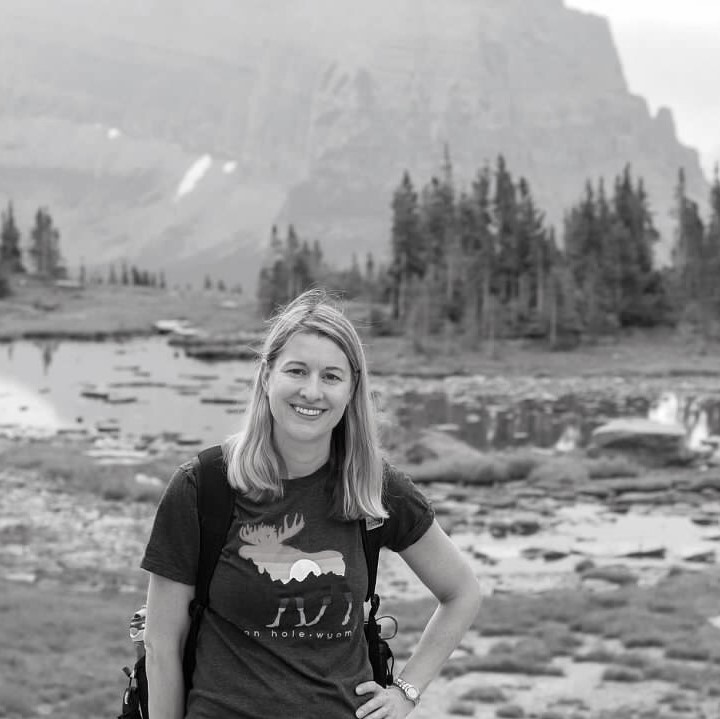 Caryn Sutorus finished a Meteorology BSc and I worked with her as an undergraduate researcher in Summer 2019. She studied low-cost air monitor data collected in northern California during the 2018 fires.
Caryn Sutorus finished a Meteorology BSc and I worked with her as an undergraduate researcher in Summer 2019. She studied low-cost air monitor data collected in northern California during the 2018 fires.
–
–
–
–
Taylor Grace
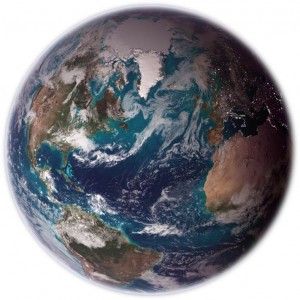
Taylor worked on a great research project in the Summer 2018 Charlotte Research Scholars program here at UNC Charlotte where she tested the hypothesis that rain reduces air pollution concentrations using a recently deployed network of PM2.5 sensors that I helped set up around Mecklenburg County in 2017. Taylor dug into weather station and radar data as well as the PM2.5 data to pull the strings together and show how rain sometimes (but not always!) helps clean out the crud in the air. Currently a graduate student at University of Oklahoma.
Charley Fite
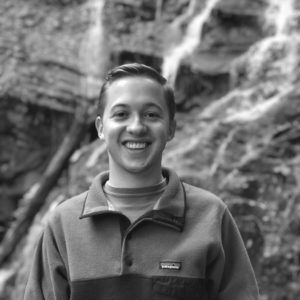 Charley graduated in Spring 2018 with his Meteorology BSc. He worked on ways to understand questions related to large-scale dynamics and climate science, and started with learning how to talk to data using python programming language. Charley did some really nice work related to the shifting bell curve of seasonal temperature distributions around the Southeastern USA using data from NOAA NCEI, worked as an air quality intern at the Environmental Protection Agency in Summer 2016, and worked as a atmospheric chemistry researcher as a part of the competitive NASA Student Airborne Research Program. He worked with UC Irvine researchers on questions about trace gas chemistry. Charley attended multiple AMS conferences, and the mighty AGU conference in Fall 2017 to meet up with his peers from SARP. He presented at the student conference for AMS in January 2018. In his Senior year (2017-18), Charley was also the President of the local student weather club with responsibilities that included bringing speakers from industry to meet with students, fund-raisers, and the UNC Charlotte Weather Fest in spring 2018. In May 2018, he completed his Honors Thesis using the NCAR LENS ensemble to understand changes in aerosol patterns and the implications in a tightly defined project titled “Aerosol and Cloud Interactions Over South America During the Next Century”. He spent most of Fall 2017 learning how to navigate the multidimensional LENS output with python, and what “netcdf” means (long live netcdf!) in order to have the foundation to do the work he wanted to do for his Honors Thesis. Finally, in April 2018, Charley was the well-deserving co-recipient of the Top Senior award in our Meteorology program here at UNC Charlotte. Charley graduated with honors in Spring 2018 but he’s not done. He worked as a summer intern at NASA Langley with Dr Amber Soja, and then he finished his PhD at the Florida State University Department of Earth, Ocean, and Atmospheric Science. Go Charley!
Charley graduated in Spring 2018 with his Meteorology BSc. He worked on ways to understand questions related to large-scale dynamics and climate science, and started with learning how to talk to data using python programming language. Charley did some really nice work related to the shifting bell curve of seasonal temperature distributions around the Southeastern USA using data from NOAA NCEI, worked as an air quality intern at the Environmental Protection Agency in Summer 2016, and worked as a atmospheric chemistry researcher as a part of the competitive NASA Student Airborne Research Program. He worked with UC Irvine researchers on questions about trace gas chemistry. Charley attended multiple AMS conferences, and the mighty AGU conference in Fall 2017 to meet up with his peers from SARP. He presented at the student conference for AMS in January 2018. In his Senior year (2017-18), Charley was also the President of the local student weather club with responsibilities that included bringing speakers from industry to meet with students, fund-raisers, and the UNC Charlotte Weather Fest in spring 2018. In May 2018, he completed his Honors Thesis using the NCAR LENS ensemble to understand changes in aerosol patterns and the implications in a tightly defined project titled “Aerosol and Cloud Interactions Over South America During the Next Century”. He spent most of Fall 2017 learning how to navigate the multidimensional LENS output with python, and what “netcdf” means (long live netcdf!) in order to have the foundation to do the work he wanted to do for his Honors Thesis. Finally, in April 2018, Charley was the well-deserving co-recipient of the Top Senior award in our Meteorology program here at UNC Charlotte. Charley graduated with honors in Spring 2018 but he’s not done. He worked as a summer intern at NASA Langley with Dr Amber Soja, and then he finished his PhD at the Florida State University Department of Earth, Ocean, and Atmospheric Science. Go Charley!
Warren Pettee
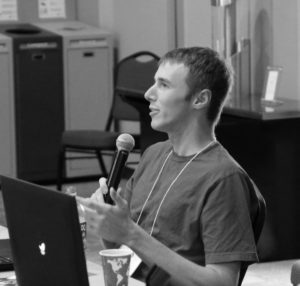 Warren was a long-time member of my research group starting as an undergraduate, and then working “on the side” on projects of data visualization via our campus weather station (which is the project he started as an undergraduate!). He is now working at University of Nebraska Lincoln and the High Plains Regional Climate Center (HPRCC) on how weather and climate data can best be interwoven with the web and stake-holder needs. He is also working on finishing a Masters degree in Earth Sciences here at UNC Charlotte, noting he also graduating with a Meteorology BSc in Spring 2015. His research project is to use WRF in various configurations on UNC Charlotte computers to evaluate mesoscale and microscale forecasting in the Southeastern USA. Warren began working on WRF in Fall 2013, and by Spring 2014, he had an “operational” nested-grid run to predict North Carolina weather from WRF. Operational weather forecast here means that Warren compiled and ran WRF within a time window that beat the next data initialization. He quickly developed a high level of proficiency at shell-scripting, NCAR Command Language (NCL), Python, a little bit of Fortran, and a lot of code-debugging. A very versatile skill set! Warren is active on twitter (@wpettee), was the co-host of Skytalk on Radio Free Charlotte, and was active in the UNC Charlotte Meteorology program for many years, including being a key organizer of student-run Weather Fests. He presented climatology work he completed with Dr. Matt Eastin at the UNC Charlotte Undergraduate Research Conference in Spring 2014. Warren was selected to be a 2014 Charlotte Research Scholar at UNC Charlotte. I posted about this on the department webpage, but it is worth saying again that he was among the 54 students selected from a pool of 150 applicants. CRS is an excellent program for undergraduates, and Warren received $4000 funding for summer research related to studies of weather on UNC Charlotte campus. His specific project was supervised by myself and Professor Matt Eastin – we worked together to bring the UNC Charlotte Meteorology Program “Niner Nation Weather” Display to life on the 1st floor of the McEniry building. This very outreach-oriented CRS project will also include some major computer work behind the scenes, and this is what Warren focused on. He presented his work at the CRS symposium in July 2014. Warren worked as a paid intern in the my research group on weather modeling and weather data management and display in 2014-2015, before graduating and joining the research group as a graduate student. His research project was advised formally by Professor Matt Eastin, but Warren continued to explore data and web-data interfacing with me.
Warren was a long-time member of my research group starting as an undergraduate, and then working “on the side” on projects of data visualization via our campus weather station (which is the project he started as an undergraduate!). He is now working at University of Nebraska Lincoln and the High Plains Regional Climate Center (HPRCC) on how weather and climate data can best be interwoven with the web and stake-holder needs. He is also working on finishing a Masters degree in Earth Sciences here at UNC Charlotte, noting he also graduating with a Meteorology BSc in Spring 2015. His research project is to use WRF in various configurations on UNC Charlotte computers to evaluate mesoscale and microscale forecasting in the Southeastern USA. Warren began working on WRF in Fall 2013, and by Spring 2014, he had an “operational” nested-grid run to predict North Carolina weather from WRF. Operational weather forecast here means that Warren compiled and ran WRF within a time window that beat the next data initialization. He quickly developed a high level of proficiency at shell-scripting, NCAR Command Language (NCL), Python, a little bit of Fortran, and a lot of code-debugging. A very versatile skill set! Warren is active on twitter (@wpettee), was the co-host of Skytalk on Radio Free Charlotte, and was active in the UNC Charlotte Meteorology program for many years, including being a key organizer of student-run Weather Fests. He presented climatology work he completed with Dr. Matt Eastin at the UNC Charlotte Undergraduate Research Conference in Spring 2014. Warren was selected to be a 2014 Charlotte Research Scholar at UNC Charlotte. I posted about this on the department webpage, but it is worth saying again that he was among the 54 students selected from a pool of 150 applicants. CRS is an excellent program for undergraduates, and Warren received $4000 funding for summer research related to studies of weather on UNC Charlotte campus. His specific project was supervised by myself and Professor Matt Eastin – we worked together to bring the UNC Charlotte Meteorology Program “Niner Nation Weather” Display to life on the 1st floor of the McEniry building. This very outreach-oriented CRS project will also include some major computer work behind the scenes, and this is what Warren focused on. He presented his work at the CRS symposium in July 2014. Warren worked as a paid intern in the my research group on weather modeling and weather data management and display in 2014-2015, before graduating and joining the research group as a graduate student. His research project was advised formally by Professor Matt Eastin, but Warren continued to explore data and web-data interfacing with me.
William Ruble
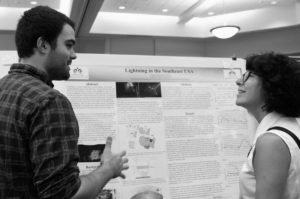 William (or “Max”) graduated in Spring 2016 with a BS in Earth and Environmental Sciences. Max worked with me as a part of the UNC Charlotte Research Scholars program on NLDN lightning statistics. Separate from work in my group, he also went to Iceland to explore ideas in sustainability. Last I heard, he was working on a Masters in Climate Science and Solutions at Northern Arizona University starting in Fall 2016.
William (or “Max”) graduated in Spring 2016 with a BS in Earth and Environmental Sciences. Max worked with me as a part of the UNC Charlotte Research Scholars program on NLDN lightning statistics. Separate from work in my group, he also went to Iceland to explore ideas in sustainability. Last I heard, he was working on a Masters in Climate Science and Solutions at Northern Arizona University starting in Fall 2016.
–
–
Cody Ledbetter
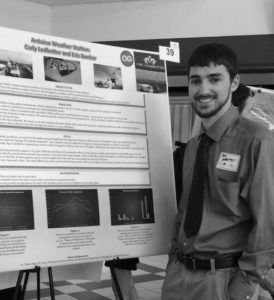 Cody graduated in Spring 2016 with a BSc in Meteorology. In Fall 2016, he started at UNC Charlotte in our Masters in Earth Sciences program working with Professor Casey Davenport on severe weather research. Cody and another undergraduate (Eric Bunker) worked on building and deploying a make-shift weather station using Arduino micro-electronics and some rudimentary python programming. They even tested it against our rooftop Vantage ProII weather station to figure out how good the device they built was. Cody went on to finish a Masters degree in Earth Sciences with Professor Davenport and, as of Summer 2018, has a forecasting job at the NWS office in Sterling Virginia.
Cody graduated in Spring 2016 with a BSc in Meteorology. In Fall 2016, he started at UNC Charlotte in our Masters in Earth Sciences program working with Professor Casey Davenport on severe weather research. Cody and another undergraduate (Eric Bunker) worked on building and deploying a make-shift weather station using Arduino micro-electronics and some rudimentary python programming. They even tested it against our rooftop Vantage ProII weather station to figure out how good the device they built was. Cody went on to finish a Masters degree in Earth Sciences with Professor Davenport and, as of Summer 2018, has a forecasting job at the NWS office in Sterling Virginia.
–
Eric Bunker
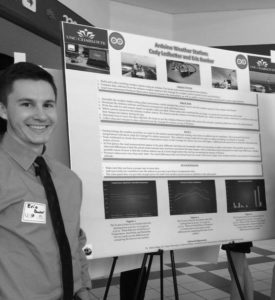 Eric graduated in Spring 2016 with a BS in Meteorology. In Fall 2016, he started at the SUNY Albany Atmospheric Sciences graduate program. Eric officially worked with Professor Davenport, but he and Cody worked together on the microelectronics project. As of 2018, Eric continues his graduate studies at SUNY Albany.
Eric graduated in Spring 2016 with a BS in Meteorology. In Fall 2016, he started at the SUNY Albany Atmospheric Sciences graduate program. Eric officially worked with Professor Davenport, but he and Cody worked together on the microelectronics project. As of 2018, Eric continues his graduate studies at SUNY Albany.
–
–
–
–
Thomas Winesett
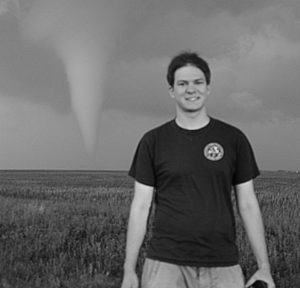 Thomas successfully completed and defended his Masters degree in Earth Sciences with an emphasis on Meteorology. He started at UNC Charlotte in Fall 2013, and graduated in Spring 2015, and he is now at the National Weather Service office in Jackson, Mississippi. While Thomas was at UNC Charlotte, he was partly funded as a Teaching Assistant with the Department of Geography and Earth Sciences, and partly funded via external funding (Dr. Magi as Principal Investigator) from NASA NC Space Grant in Spring 2014, Summer 2014, and Fall 2014. His Master’s project investigated whether microwave remote sensing data from satellites sensors could be used to determine cloud-to-ground lightning. He used DMSP SSM/I data and ground-based National Lightning Detection Network data, and learned about the power of programming via Python, as well as bringing his forecasting expertise to bear on the problem via archived radar data from NCDC and GR2 Analyst. Thomas attended AMS 2014 in Atlanta as a Student Assistant, AMS 2015 as a presenter at the Student Conference and Full Conference (see Presentations), and made many trips out west for storm chasing in 2014 and 2015 (here), so he remained an active participant in the meteorology community as well as being a graduate student researcher. After he left for the NWS job, I wrote up his Masters research project in collaboration with him and Dr. Dan Cecil (NASA MSFC) for eventual publication in the Journal of Applied Meteorology and Climatology (JAMC), which is a top AMS journal. See publications page for a link to the article.
Thomas successfully completed and defended his Masters degree in Earth Sciences with an emphasis on Meteorology. He started at UNC Charlotte in Fall 2013, and graduated in Spring 2015, and he is now at the National Weather Service office in Jackson, Mississippi. While Thomas was at UNC Charlotte, he was partly funded as a Teaching Assistant with the Department of Geography and Earth Sciences, and partly funded via external funding (Dr. Magi as Principal Investigator) from NASA NC Space Grant in Spring 2014, Summer 2014, and Fall 2014. His Master’s project investigated whether microwave remote sensing data from satellites sensors could be used to determine cloud-to-ground lightning. He used DMSP SSM/I data and ground-based National Lightning Detection Network data, and learned about the power of programming via Python, as well as bringing his forecasting expertise to bear on the problem via archived radar data from NCDC and GR2 Analyst. Thomas attended AMS 2014 in Atlanta as a Student Assistant, AMS 2015 as a presenter at the Student Conference and Full Conference (see Presentations), and made many trips out west for storm chasing in 2014 and 2015 (here), so he remained an active participant in the meteorology community as well as being a graduate student researcher. After he left for the NWS job, I wrote up his Masters research project in collaboration with him and Dr. Dan Cecil (NASA MSFC) for eventual publication in the Journal of Applied Meteorology and Climatology (JAMC), which is a top AMS journal. See publications page for a link to the article.
Amber McGinnis
 Amber finished her Meteorology major in Spring 2014. She worked on an Independent Study course credit in her final semester at UNC Charlotte studying lightning climatology in the Charlotte region from the National Lightning Detection Network. Her work explored whether there were any detectable biases in where lightning tended to occur in Mecklenburg and surrounding counties. Initial results suggested parts of the counties indeed had more lightning, but more investigation is needed to study a longer time series of data. Amber was hired by Accuweather in Wichita, Kansas.
Amber finished her Meteorology major in Spring 2014. She worked on an Independent Study course credit in her final semester at UNC Charlotte studying lightning climatology in the Charlotte region from the National Lightning Detection Network. Her work explored whether there were any detectable biases in where lightning tended to occur in Mecklenburg and surrounding counties. Initial results suggested parts of the counties indeed had more lightning, but more investigation is needed to study a longer time series of data. Amber was hired by Accuweather in Wichita, Kansas.
–
Sean Malone
 Sean finished his Meteorology major in Spring 2014 and worked on Independent Study course credit in Fall 2013. His project investigated the correlation between NLDN ground-based lightning and OTD/LIS space-based lightning observations. Preliminary conclusion suggested seasonal lightning patterns were similar, but more investigation is needed to understand magnitude differences.
Sean finished his Meteorology major in Spring 2014 and worked on Independent Study course credit in Fall 2013. His project investigated the correlation between NLDN ground-based lightning and OTD/LIS space-based lightning observations. Preliminary conclusion suggested seasonal lightning patterns were similar, but more investigation is needed to understand magnitude differences.
–
–
–
–
Daniel Cunningham
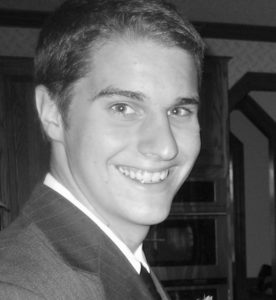 Daniel Cunningham graduated with a Meteorology BSc in Spring 2013. He was a part of my research group through the CRS Scholars program at UNC Charlotte that provided $4000 in summer funding for Daniel to do this research. Daniel was one of the 50 UNC Charlotte undergraduate students selected out of a pool of over 170 applicants! Daniel worked with Dr Magi on a project called Lightning and Fires from June-July 2012. For the Lightning and Fires project, Daniel examined whether there is a statistical relationship between lightning over North America where data is readily available and where data is not readily available. This is a study using remotely-sensed lightning observations from NASA satellite sensors. Daniel presented his results on 25 July 2012 at a CRS Symposium. Daniel continued his research from CRS during the Fall and Spring Semesters of his senior year in Independent Study with Dr Magi. He presented his work at the January 2013 AMS conference in Austin and at the UNC Charlotte Undergraduate Research Conference in April 2013. Daniel won 1st place for his URC poster. Daniel was working on a Masters degree in Atmospheric Sciences at the University of Alabama Huntsville, but I am not sure what he is doing now.
Daniel Cunningham graduated with a Meteorology BSc in Spring 2013. He was a part of my research group through the CRS Scholars program at UNC Charlotte that provided $4000 in summer funding for Daniel to do this research. Daniel was one of the 50 UNC Charlotte undergraduate students selected out of a pool of over 170 applicants! Daniel worked with Dr Magi on a project called Lightning and Fires from June-July 2012. For the Lightning and Fires project, Daniel examined whether there is a statistical relationship between lightning over North America where data is readily available and where data is not readily available. This is a study using remotely-sensed lightning observations from NASA satellite sensors. Daniel presented his results on 25 July 2012 at a CRS Symposium. Daniel continued his research from CRS during the Fall and Spring Semesters of his senior year in Independent Study with Dr Magi. He presented his work at the January 2013 AMS conference in Austin and at the UNC Charlotte Undergraduate Research Conference in April 2013. Daniel won 1st place for his URC poster. Daniel was working on a Masters degree in Atmospheric Sciences at the University of Alabama Huntsville, but I am not sure what he is doing now.